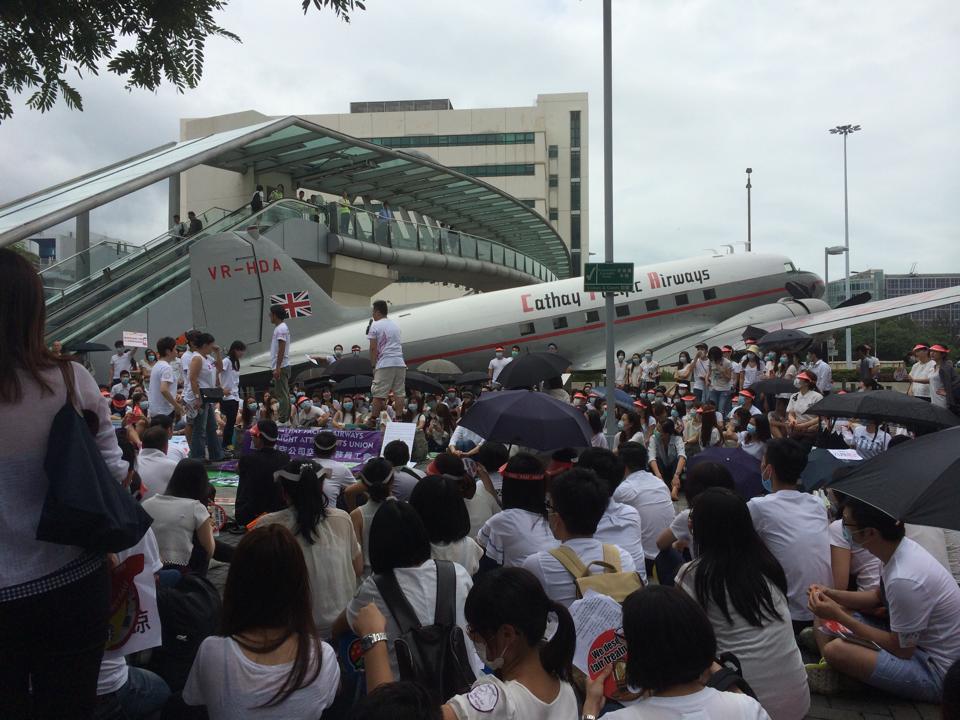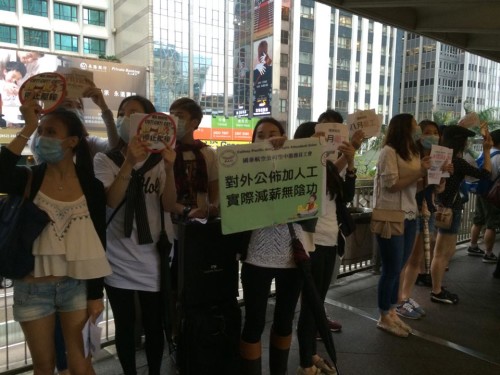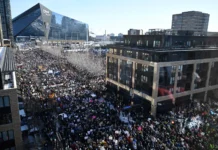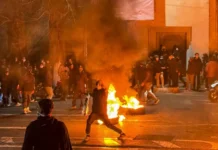Protesting cabin crew at Hong Kong airport explained their grievances to Socialist Action reporters

Nearly 1,000 cabin crew at Cathay Pacific airline staged a two-day sit-in protest at Hong Kong’s International Airport on 19-20 May, in protest over a series of attacks by management, including a cut in allowances, unequal pay and cancelation of legal protection for the workers.
The Cathay Pacific Airways Flight Attendants Union (CPAFAU) set a deadline for the company to respond by 10am on 22 May. Hundreds of Cathay’s crew marched to the Cathay City compound surrounding the head offices of the company and chanting “shame on Cathay Pacific, the best exploitative company!”. The company has refused to officially respond to the workers’ demands until now. The union now threaten to escalate the struggle, staging strike action during the peak traveling season of August. The provisional date for action is from 18 August for two weeks.
There are around 10,000 employees at Cathay Pacific, while 6,300 of them are union members. The union made it clear that once they go on strike, it will have a big impact on the company, and they welcome more workers to join the union. The union also led the workers to the Central district of Hong Kong on the afternoon of 21 May to give out leaflets, winning support and sympathy from the public.
Real wages fall
Ms Pun has been working at Cathay for more than ten years. She said that while the company projects a positive image to the public, in reality the workers’ benefits are getting worse year by year. “The thing I dislike most is that the company is telling the public they are giving us a pay rise, but in reality they are cutting our benefits. The tickets are getting more and more expensive, but the money is not going to the front-line employees.”
She pointed out that Maggie Yeung, the general manager of Cabin Crew at Cathay, announced to the public that employees will receive a double-digit increase in their salary, but at the same time the company have cut the crew benefits from behind. The net result is that the workers are getting a pay cut in real terms.
Cabin crew get a break when they arrive at their foreign destination; the company provides extra allowance covering food and accommodation. “Now the quality of the hotels we receive from the company are worsening. It is also stated in our contracts that the company should provide us with food of mid-price range, but this has seen a quality cut too! In effect our benefits are being reduced.”
The reduction of break time is one of the most unpopular issues. The company reduced the break time when staying overseas, this means a decrease in rest time, which in turn will affect the safety of the passengers. A flight attendant of four years service said, “For instance, policies such as three days in Auckland [New Zealand], four days in Boston [US], are only being implemented recently. Take Auckland as an example, this is a long-distance flight of ten to eleven hours, but we are only given 24 hours of rest in between flights. There is a time difference of five hours between Hong Kong and Auckland, and so we do not have enough rest!”

Mounting pressure on front-line workers
“Oil prices are dropping now, but why are the tickets prices still increasing? Yet our benefits are being cut!” one air hostess angrily told us.
New recruits sign a different contract to existing employees, thus leading to the problem of unequal pay for the same job. A flight attendant of seven years was angry at this: “The hourly pay for a permanent contract is HK$176 (US$22.70), but some only get HK$159 (US$20.50). Why is there unequal pay for the same job? The allowance for overseas stays for newcomers can account for up to one-third of their salary – with that being cut it will affect them dearly.”
In fact, the quality of services provided to the passengers is also declining. The flight attendant added that food portions are smaller now. Ms Pun pointed out that that the amount of food on board has decreased, and many passengers may not get what they want. It is the flight attendants that have to apologise for this. “In many cases we have to sacrifice our own food for the passenger. Why would this even happen? The success of the company is based on the hard work of all front-line employees, but the company is not taking care of us.” Many workers complained that the sandwiches and water originally provided during work has been withdrawn as well.
The last time Cathay Pacific’s workers went on strike was in 1993. About 3,000 cabin crew went on strike during the Lunar New Year for 17 days.
Socialist Action fully supports the struggle of the Cathay Pacific workers, to defend wages and allowances. Fight against unequal contracts, unite together against exploitation.




